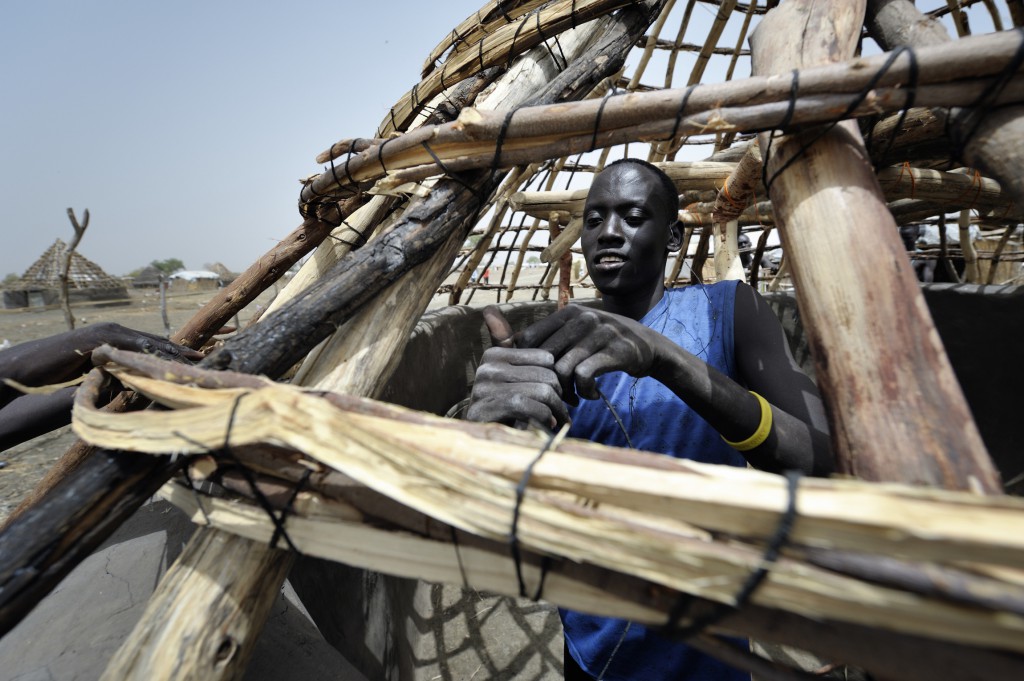
By Paul Jeffrey
Father Biong Kuol’s parish is a sprawling collection of temporary huts made from sticks and sun-bleached plastic sheeting. A few skinny cows and goats wander about.
The huts contain few personal belongings, as most of the displaced families living here fled from villages to the north with nothing but the clothes on their backs. They’ve lived almost two years in a camp that the world is trying hard to ignore.
“People want to go home. Agok is crowded. The ground turns to mud when it rains. Back home, everyone has a plot of their own to farm. But they’re afraid of another attack from the North, so they remain here. As long as they are here, the church will be here with them, even if the rest of the world doesn’t seem to notice,” said Father Kuol, one of two priests based in the parish in the town of Abyei.
“Our job as priests is to give hope to the people. In our preaching we often talk about all the trials that Israel passed through, but God was always with them. History repeats with us. God remains with us,” Father Kuol told Catholic News Service.
Agok was a small village on the southern edge of the contested Abyei region, yet when northern militias and Sudanese soldiers attacked villages in the rest of Abyei in 2011, most of the more than 100,000 people who ran for their lives stopped their flight here, transforming the fields around the village into a refugee camp.
Displaced along with the people they serve, Father Kuol and Father Karlo Kaw built their own mud-walled huts beside an open-air chapel and erected some tattered UNICEF tents to house classes of the church-run primary school. It’s a far cry from the church compound in Abyei town, about 28 miles to the north, with its large sanctuary, parsonage, guesthouse, school classrooms and a warehouse. Yet those buildings are in ruins, looted and burned by the northern attackers.
Father Kuol was appointed to Abyei in 2009, on the heels of an earlier attack on Abyei town. It was not considered a plush assignment for the young priest.
“Everything was destroyed; even the windows and doors were gone. There was not even a chair to sit on. There was no place to sleep, to pray, or to eat. We started from zero under the trees. But over time we cleaned up rubble, fixed the doors and windows. Catholic Relief Services gave us a generator for the compound. We put it all back together. But then we lost it all again in 2011, when they attacked again,” he said.
Abyei sits on the border between Sudan and the newly independent South Sudan. Under a 2005 peace plan, it was supposed to have a referendum in 2011 to decide whether it would become part of the north or the south. Yet the vote never happened, in part because the government in Khartoum insisted that the nomadic Misseriya, who spend part of each year grazing their animals in Abyei, be included. The Dinka Ngok, who compose the vast majority of Abyei residents, insisted that only permanent residents could vote. The debate ended when the North attacked in the spring of 2011.
The northern forces laid siege on Abyei and the surrounding villages for several weeks. Father Kuol covered his white jeep with mud to disguise it from the North’s Antonov bombers. He spent most of his days helping bury the dead, as many as 70 burials in one day. Most of those killed, he said, were those who were too old or infirm to escape from the Misseriya militias that functioned as a proxy for Sudan’s military.
Father Kuol had traveled to El Obeid, Sudan, for a meeting of the diocese’s priests when the town of Abyei finally fell May 21, 2011. He returned home via Juba, South Sudan, where he spent a day planning an emergency response with staff of the U.S. bishops’ Catholic Relief Services, the lead agency for Abyei in the Caritas network. He then drove to Agok with a CRS team and started distributing food and other emergency supplies to more than 5,000 families.
“It started raining, and the soldiers from the North got bogged down in the mud just north of Agok, so every morning they would start shelling the town with their artillery. They always stopped right at 4 p.m. But the Antonovs could come anytime,” he said.
Since the northern troops withdrew a year ago, several thousand of the displaced have returned home, yet many of them return regularly to Agok, still unsure of the political situation. In addition, most international aid agencies, afraid of repercussions for their work in the North, have either stayed away or kept a low profile in Abyei. The Catholic parish is an exception, and with help from the Caritas network has reopened clinics and drilled wells in some of the devastated communities. Working with Solidarity with South Sudan, an international group of Catholic volunteers, the parish has conducted training sessions for displaced teachers.
“It’s easy to be overwhelmed by the needs of people here, to feel like giving up, especially those times when I don’t have one pound in my pocket,” Father Kuol said. “If I didn’t have faith in God, I’d give up. Yet help often shows up when I least expect it, and somehow we survive.” – CNS